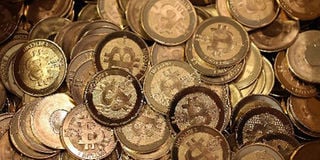Secure your cryptocurrencies from hackers

A pile of Bitcoin slugs sitting in a box ready to be minted.Before you invest in the digital tokens, understand how they work and the safety precautions you should take. PHOTO | AFP
What you need to know:
- Don’t trade on an exchange or transfer your funds between wallets on a shared computer.
Generate passwords that are strong enough but easy to remember. Use Google’s two-factor authentication.
Distribute your funds across exchange platforms and offline wallets. Use trusted exchanges like Binance and Bittrex.
Adoption of cryptocurrency is taking a top notch in Kenya: We have a Bitcoin ATM in parklands, Nairobi, and a restaurant in Nyeri is accepting Bitcoin as a method of payment.
I have friends who have made successful crypto investments and others who have made huge losses not only from the current volatility but also hacking, transferring to the wrong address and lack of information.
Bitcoin was created using the blockchain technology, which makes permanent, secure digital recordings that don’t rely on a person or group. Multiple blockchain records are maintained simultaneously by a large group of unrelated individuals and their computers. Updates are seen immediately and manipulation is difficult.
1,500
Cryptocurrency is derived from ‘crypto’ and ‘currency’. Crypto is short for ‘cryptography’, a computer technology used for securing and hiding information from theft and alteration. Currency is, obviously, the money in use.
Cryptocurrency is digital money created with blockchain controlling its creation and protecting transactions while hiding the identities of its users. Bitcoin is the first and most common, created in 2009 by an unknown person or group known as Satoshi Nakamoto.
There are more than 1,500 other cryptocurrencies.
After purchasing crypto, you need a wallet — where you can store your cryptocurrencies. It can be a software on your computer (desktop wallet), phone, flash drive or exchanges. You can print a piece of paper as your wallet.
PRECAUTIONS
Nobody has hacked the blockchain network; the wallets is where hacks are happening.
Recently, a South Korean exchange lost $40 billion from hackers accessing their wallets. Individuals have lost tokens and coins worth millions. So, how do you keep your crypto investments safe?
Before you invest in the digital tokens, understand how they work and the safety precautions you should take. Currencies are different and vary between exchange platforms. Stay informed with what is happening, subscribe to news from the crypto world and follow known crypto investors.
GUNPOINT
Don’t trade on an exchange or transfer your funds between wallets on a shared computer. Generate passwords that are strong enough but easy to remember. Use Google’s two-factor authentication.
Distribute your funds across exchange platforms and offline wallets. Use trusted exchanges like Binance and Bittrex.
Talking publicly about owning cryptocurrencies is enough to draw criminal attention. Last November, Louis Meza of New York transferred his friend’s $1.8 million in ‘ether’ cryptocurrency to his own wallet at gunpoint; he knew the amount in the account.
DON'T TALK
Ian Ballina, a globally known crypto investor, regularly tweets screenshots of his portfolio. In April, while doing a live stream, he couldn’t log into the spreadsheet; a hacker had taken over his accounts.
As the New York Startup founder, Cody Brown, said, “Don’t talk publicly online, with your real identity, about your trades, portfolio or the exchanges”.
Mr Micheni is the Director of the Capital Markets Lab at Morgan State University, Baltimore, Maryland, USA. [email protected]




